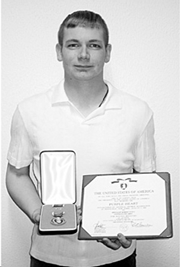Sergeant prohibited from re-enlisting after recuperation from shrapnel wounds
During his recuperation at an American medical facility in Germany this past April from his battlefield injury. Stout, of Utica, Ohio, publicly disclosed his sexual orientation to the Associated Press, indicating his desire to continue to serve, but not willing to re-enlist because of the Don’t Ask, Don’t Tell ban. “I know a ton of gay men that would be more than willing to stay in the Army if they could just be open,” Stout said in the news interview. “But if we have to stay here and hide our lives all the time, it’s just not worth it.”
Stout acknowledged being out to his platoon, a 26-man team that is part of the Ninth Engineer Battalion based in Schweinfurt, Germany.
In May 2004, while manning the gun turret of his Humvee, Stout was struck by shrapnel from a grenade launched by an Iraqi insurgent, suffering wounds to his arm, face and legs.
Stout told Aaron Belkin, the director of the Center for the Study of Sexual Minorities in the Military at the University of California at Santa Barbara, that he had been discharged last Tuesday.
Contrary to earlier reports, Stout reported that he was not discharged for being gay. “He underwent a normal administrative discharge because his term of service was up,” said Nathaniel Frank, a research fellow at the rganization, who has spent much time discussing with Stout his experiences in the military.
That Stout was able to remain in the Army even after announcing he is gay was, according to Frank, either further proof that gay discharges go down during wartime or that the soldier was so close to completing his service his commanders didn’t bother investigating and prosecuting him.
Frank said Stout is the only openly gay soldier known to have suffered wounds in Iraq.
Stout could not be reached for comment and Army media affairs officials did not confirm he had been discharged.
A recent Urban Institute study estimated that there are 65,000 gays and lesbians in the U.S. military, accounting for about 2.5 percent of all personnel. If correct, 42 gay soldiers have been killed in Iraq since the invasion.
Stout’s discharge came the same week the Army changed its court martial protocols to make it easier for soldiers to stay in the ranks even if they have failed physical training standards, abused drugs or alcohol or have unsatisfactory performance records.
As first reported by the Wall Street Journal, Army officials in a memo indicated the change was made to retain those enlistees still in their first term of service to help relieve a troop shortage.
The upshot, according to Martha Rudd, an Army spokesperson, is that “a court martial will take longer to process, and soldiers will have more time and opportunity to explain their circumstances.”
But the memo also exhorted commanders to do what they could to reduce the number of discharges. “We need your concerted effort to reverse the recent negative trend in first-term attrition. By reducing attrition one percent, the Army can save up to 3, 000 initial-term soldiers. Each soldier retained reduces the strain on recruiting command and our retention program, which must replace every soldier who departs the army early,” the memo said.
The Army, Army Reserves and National Guard have all missed their recruiting goals for the past four months. The head of recruiting, Major General Michael Rochelle, recently stated that he expected quotas to be missed for the rest of the year, and that in 2006 the Army will have only half the number of new soldiers it did in 2004.
The ongoing insurgency that has prolonged the tours of duty in Iraq, are considered the major factors in creating this downturn.
According to Steve Ralls, spokesman for the Service Members Legal Defense Network, an advocacy group for gay and lesbian members of the military, the vast majority of those discharged under the gay ban are 18-25 years old, and therefore in the group for which the Army most hopes to reduce attrition rates.
In fiscal year 2004, the Army discharged 325 service members, or less than a half of one percent of that year’s total discharges, under Don’t Ask, Don’t Tell, most of whom had served for less than a year.
Despite the comparatively low numbers, the Army can little afford to lose viable troops, especially soldiers trained in highly skilled technical fields. “To imply, by maintaining the gay ban, that lesbian and gay soldiers are somehow less fit for the Army than known drug users and those who simply cannot meet appropriate standards for service is simply outrageous,” Ralls said.
gaycitynews.com


































